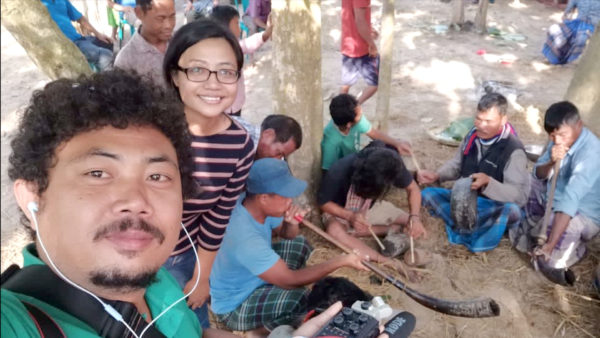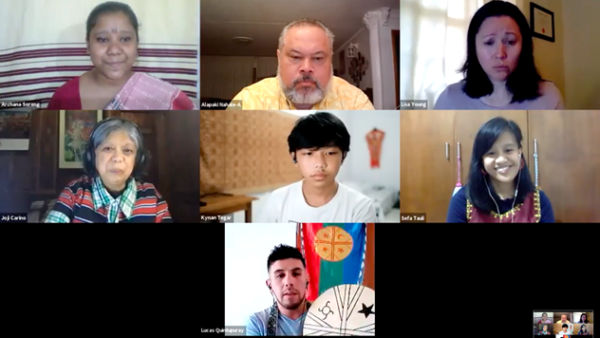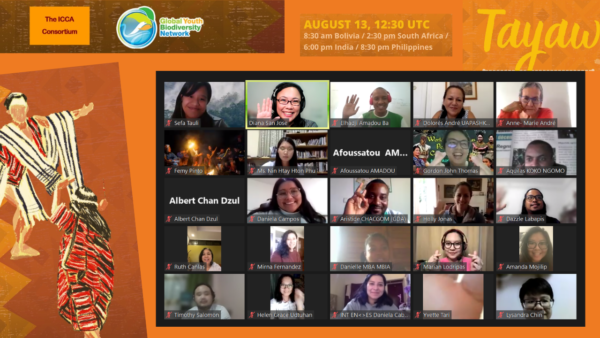The event celebrated Indigenous youth’s resilience, determination, and contributions across the region while highlighting the need for collective action to address ongoing challenges
First published on 10/26/2023, and last updated on 11/13/2023
By John Vincent Colili, Francyla Copino, Diana San Jose (NTFP-EP Asia), and Eh Htee Wah (All Burma Indigenous People Alliance ABIPA)
In August 2023, the ICCA Consortium Southeast Asia hosted a virtual campfire celebrating World Indigenous Peoples Day. The event was organized on August 11. In line with this year’s theme, “Indigenous Youth as Agents of Change for Self-determination,” Indigenous youth speakers from ICCAs–territories of life from across the region—youth leaders who actively strengthen territories of life through community-based initiatives and advocacy works—shared their experiences and insights.
The campfire provided a platform for them to share their success stories, experiences, and ideas for creating positive outcomes within their communities. The event also showcased the remarkable achievements and potential of Indigenous communities in Southeast Asia when it comes to community empowerment and sustaining territories of life.
The celebration provided a space for Indigenous youth to network, collaborate, and support each other. By bringing together diverse Indigenous youth speakers and participants, the virtual campfire fostered a sense of solidarity and unity among them.
Dedi Iskandar and Diana San Jose of NTFP-EP Indonesia and NTFP-EP Asia co-hosted the campfire on Zoom. The virtual campfire started with a video presentation of Indigenous youth from Southeast Asian countries sharing their insights on regional issues. The video highlighted some of the most pressing concerns and issues faced by the Indigenous youth, along with their aspirations and contributions to achieving self-determination.
Indigenous youth speakers shared their experiences, insights, and initiatives throughout the event. One of the common themes of their speeches was their active engagement in strengthening territories of life through community-based projects and multi-level advocacy efforts, highlighting the essential contribution of youth in enhancing cultural heritage, biodiversity, and sustainable practices.
A panel discussion moderated by Cindy Julianty, Advocacy Coordinator of ICCA Consortium Southeast Asia and Program Manager of Working Group ICCAs Indonesia (WGII), offered an in-depth dive into the local, regional, and international initiatives of Indigenous youth leaders from different corners of the region.
Asami Segundo, an Indigenous youth leader from Kalahan territory of life in Nueva Vizcaya, Philippines, shared her learnings from the Bonn Climate Change Conference 2023 in Bonn, Germany, particularly on the gaps in existing policies and global commitment to climate change mitigation and adaptation about the rights of Indigenous Peoples and local communities including youth participation.
Segundo highlighted the need for greater participation of Indigenous Peoples in international environmental policymaking. “As Indigenous youth, let us continue to dream for our community, to dream for the recognition of our rights, and to amplify our voices in both local and international platforms for the generation who fought for us and the generation who will be coming after us.”
She argued that their voices and perspectives are essential in ensuring inclusive and sustainable policies. “I believe that there should be first a recognition of Indigenous Peoples as key players, not just in the forefront, not just a vulnerable people in climate change and adaptation but that we play a vital role in climate action, and there should also be a recognition of Indigenous knowledge, systems, and practices,” Segundo said.
Eh Htee Wah, an Indigenous Karen from Myanmar and the current youth-actions coordinator of the Southeast Asia ICCA Consortium shared what the consortium has been doing to ensure youth are involved in the bigger ICCAs–territories of life and conservation agenda.
Eh Htee said that the ICCA Consortium has embarked on various activities to build the capacity of Indigenous Youth in multiple areas, including documentation and action research. According to her, these programs are essential in initiating empowerment, knowledge, and skills build-up among Indigenous youth.
“The involvement of the [Indigenous youth] in decision-making fosters intergenerational transfer and empowers youth to contribute and participate [with] their perspectives and innovative ideas. It ensures holistic and sustainable biodiversity management,” said Eh Htee.
“The future is in our hands. Our future will depend on what we are doing now. We are guarding the planet now – almost 80% of the remaining global biodiversity – because we apply and respect traditional knowledge, wisdom, and culture. We need each other for solidarity and collaboration, and we believe we can create a brighter and more sustainable future for all.”
Michelin Sallata, an Indigenous leader from South Sulawesi and Chairwoman of Barisan Pemuda Adat Nusantara (BPAN), shared about the struggles of their community to ensure the intergenerational transfer of knowledge from elders to younger generations.
Michelin discussed that due to the nature of challenges the Indigenous Communities face in this era, every member of the community, regardless of their background, gender, and experience, should have an equal role in contributing to the decisions that would impact future generations.
“Our goal and what we are trying to send is a narrative that Indigenous youth also can participate even in the critical decision-making process,” Sallata said. She also had a message addressed to elders and her fellow Indigenous youth: “To our wisdom-holders, let us keep on doing intergenerational discussions and intergenerational transfer of knowledge. We, Indigenous youth, can keep bearing the torch of wisdom and power to the next generation to save the world.”
JV Colili, another Indigenous Youth from Palawan, the Philippines, shared the importance of Indigenous youth-led platforms in strengthening territories and ensuring intergenerational transfer of knowledge and inclusivity.
JV expounded that these “simple initiatives” are vital in developing Indigenous Youth’s confidence and skills that could enable them to make more meaningful contributions to their communities and regions as the new agents for change and self-determination.
“I believe that these are the necessary baby steps or small strides that we need to take for us to achieve what we envision for the youth, for them to meaningfully contribute in the decision within their communities or their countries in general,” said Colili.
In his closing statement, Colili mentioned the “need [for] sustained and continued efforts to amplify youth voices so that young generations of Indigenous Peoples youth leaders can be more active agents of change for self-determination in the future and now.”
An interactive activity followed the panel discussion. The participants were divided into several small breakout rooms where they could reconnect with old friends and be introduced to new people.
Two Indigenous youth-produced documentary films from territories of life in Bali, Indonesia, were also launched during the event. Before the screening of the films, the films were introduced by producers. Elman Thiana, one of the creators of the film “Guardian’s Struggle” and a member of the youth organization BRASTI and Rio Wedayana from the OMBO youth organization who produced the documentary on “Pohon Jaka” as part of their participatory action research work.
The Guardian’s Struggle tells us about the issues faced by communities in Tamblingan on Indonesia’s Bali Island and their actions to push back these threats. The ‘Pohon Jaka’ video, on the other hand, features the jaka plant and its importance to the Tenganan Pegringsingan traditional village in Bali and the underlying beliefs, traditions, and practices involved in the production of palm wine from these trees as one of the primary sources of income for the community.
The event concluded with a storytelling session from Masagus Achmad Fathan Mubina of WGII, who shared the book “50 Indigenous Leaders’ Voices for Nature and People in Indonesia.”
The story has been included in the book featuring interviews with fifty Indigenous leaders and activists from across Indonesia, revealing that conservation of the natural environment is a fundamental part of their cultures and codes of ethics and that for Indigenous Peoples, conservation and sustainable development are not just about protecting the environment, but also about protecting their cultures and ways of life, and that their territories are not just land, but the source of all life.
“Celebrating Indigenous Youth Engagement and Empowerment in Southeast Asia” provided a platform for the youth to exchange insights and experiences. It served as an opportunity to celebrate their resilience, determination, and contributions while highlighting their ongoing challenges and the need for collective action to address them.
It served as a reminder that Indigenous youth empowerment is not just a celebration but a catalyst for meaningful change and a testament to the enduring importance of Indigenous knowledge, practices, and self-determination.
The Southeast ICCA Consortium is continually working with its other partners to host more youth events to celebrate the achievements and accomplishments of young Indigenous youth leaders across the region.
You can watch the recording of the event here on YouTube.


